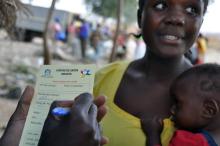Healthy beginnings, hopeful futures
Today, Angola joins the global community in celebrating World Health Day, which is dedicated to maternal and child health under the “Healthy Beginnings, Hopeful Futures.” This day commemorates the founding of the World Health Organization (WHO) in 1948, and it´s an occasion to call for communities, organizations, and governments to work together to advocate for actions that can improve people's health and well-being worldwide.
This year, World Health Day, observed under the theme “Healthy Beginnings, Hopeful Futures,” is a solemn reminder of our collective responsibility to end preventable maternal and newborn deaths and prioritize women’s and children’s long-term health and well-being.
Despite significant advances, maternal and newborn deaths remain a critical problem. Worldwide, around 300,000 women die every year from pregnancy-related causes, and more than 2 million babies die in their first month of life. In the WHO African Region, 20 mothers and 120 newborns die every hour, totaling 178,000 maternal deaths and 1 million newborn deaths per year.
These statistics represent real lives lost, families torn apart, and futures disrupted. The WHO calls for intensified efforts by governments, the private health sector, civil society, and development partners to ensure access to quality and equitable health care, especially in low-income countries and vulnerable contexts.
Dr. Indrajit Hazarika, WHO representative in Angola, stresses that: “World Health Day is an opportunity to celebrate the remarkable progress the world has made in health and to advocate for urgent actions to address the deep challenges that persist. This year, we focus on maternal and child health as every seven seconds, somewhere in the world, a preventable death of a woman or child occurs. These are not just numbers; they represent real lives lost, families shattered, and futures cut short.”
Angola has made significant progress in maternal and child health, reducing neonatal mortality from 24 to 16 deaths per 1,000 live births, infant mortality from 44 to 32 deaths per 1,000 live births, and under-five mortality from 68 to 52 deaths per 1,000 live births. However, challenges remain, particularly with regard to coverage of prenatal care and skilled birth attendance.
To significantly improve maternal and child health and protect mothers and their babies, the WHO encourages the government and partners to invest in high-impact maternal and newborn health services, expand equitable access to quality care, adopt laws that protect health rights, address social and economic inequalities and strengthen accountability and innovation.
The recently developed Integrated Strategic Plan for Sexual, Reproductive, Maternal, Neonatal, Child, Adolescent, and Nutritional Health (SRMNIA-N) serves as an essential tool to guide universal coverage of high-impact, quality interventions to reduce maternal and child mortality and improve the population’s nutritional status. The Plan is aligned with the Luanda Declaration issued in June 2022. It provides the political direction to implement the “national commitment to the health of children, women and the fight against major endemic diseases.”
Dr. Hazarika adds: “Investing in maternal and newborn health yields substantial economic returns, as well as saving lives, with estimates suggesting that every dollar invested can generate a return of $7. Besides the economic benefits, every saved life contributes to the continuation of families, communities, and stronger societies. Let’s work together, with the government, families, private sector, universities, and all partners, to ramp up efforts to end preventable maternal and newborn deaths and to prioritize women’s longer-term health and well-being in Angola.”
The WHO renews its commitment to supporting Angola in improving maternal and child health, ensuring that every healthy start in life leads to a promising future for children, families, and communities.

